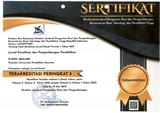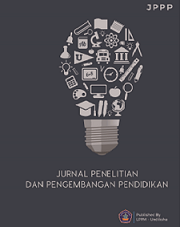Kahoot!-Based Interactive Multimedia: Can it Increase Social Studies Learning Interest?
DOI:
https://doi.org/10.23887/jppp.v8i2.83983Keywords:
Kahoot!, Interactive Multimedia, Social Studies, Learning InterestAbstract
The Industrial Revolution 4.0 requires teachers to adapt, master, and use technological devices supporting learning. However, the current problem is that many teachers still need help developing digital learning media for learning activities. This research aims to create interactive multimedia based on Kahoot! to increase fourth-grade elementary school student's interest in learning Social Sciences. This research uses the ADDIE model, which involves analysis, design, development, implementation, and evaluation. The research subjects were 30 elementary school students. This research uses a one-group pretest-posttest design. Data collection methods use questionnaires and tests. Data collection instruments use questionnaire sheets and test questions. Data analysis techniques use descriptive qualitative, quantitative analysis, and inferential statistics. The research results show a significant difference between the Pretest and post-test, which were treated using Kahoot! Multimedia based. Interactive multimedia based on Kahoot! can increase interest in learning Social Sciences in fourth-grade elementary school students.
References
Al-Tawaha, A., Kaushik, H., Sel, B., Jia, R., & Jin, M. (2023). Decision-Focused Learning for Inverse Noncooperative Games: Generalization Bounds and Convergence Analysis. Science Direct, 56(2), 9336–9341. https://doi.org/10.1016/j.ifacol.2023.10.221. DOI: https://doi.org/10.1016/j.ifacol.2023.10.221
Al Ghawail, E., A., Yahia, S., & B. (2022). Using the E-Learning Gamification Tool Kahoot! to Learn Chemistry Principles in the Classroom. Science Direct, 207, 2667–2676. https://doi.org/10.1016/j. DOI: https://doi.org/10.1016/j.procs.2022.09.325
Anggraeni, W. S., Alpian, Y., Prihamdani, D., & Winarsih, E. (2021). Pengembangan Multimedia Pembelajaran Interaktif Berbasis Video untuk Meningkatkan Minat Belajar Siswa Sekolah Dasar. Jurnal Basicedu, 5(6), 5313–5327. https://doi.org/10.31004/BASICEDU.V5I6.1636. DOI: https://doi.org/10.31004/basicedu.v5i6.1636
Anufriev, M., Duffy, J., & Panchenko, V. (2024). Individual evolutionary learning in repeated beauty contest games. Journal of Economic Behavior and Organization, 218, 550–567. https://doi.org/10.1016/j.jebo.2023.12.010. DOI: https://doi.org/10.1016/j.jebo.2023.12.010
Balalle, H. (2024). Exploring student engagement in technology-based education about gamification, online/distance learning, and other factors: A systematic literature review. Social Sciences & Humanities, 9(100870), 2590–2911. https://doi.org/10.1016/j.ssaho.2024.100870. DOI: https://doi.org/10.1016/j.ssaho.2024.100870
Battigalli, P., Panebianco, F., & Pin, P. (2023). Learning and selfconfirming equalibria in network games. Science Direct, 212(105700). https://doi.org/10.1016/j.jet.2023.105700. DOI: https://doi.org/10.1016/j.jet.2023.105700
Bawa, P., & Brockport, S. (2021). What do they think and why it matters? Views of administrators and faculty on the use of Massively Multiplayer Online Games for Learning. Computers and Education Open, 2(100034). https://doi.org/10.1016/j.caeo.2021.100034. DOI: https://doi.org/10.1016/j.caeo.2021.100034
Blas, H., S., S., Mendes, A., S., D. la I., D., H., Silva, L., A., Gonzales, G., & V. (2024). A Multiagent Platform for promoting physical activity and learning through interactive educational games using the depth camera recognition system. Entertainment Computing, 49(100629). https://doi.org/10.1016/j.entcom.2023.100629. DOI: https://doi.org/10.1016/j.entcom.2023.100629
Blinkoff, E., Nesbitt, K., T., G., R., M., Pasek, K., & H. (2023). Investigating the contributions of active, playful learning to student interest and educational outcomes. Acta Psychologica, 238(103983). https://doi.org/10.1016/j.actpsy.2023.103983. DOI: https://doi.org/10.1016/j.actpsy.2023.103983
Boysen, M., S., W., Lund, O., Jorno, R., L., Skovbjerg, H., & M. (2023). The role of expertise in playful learning activities: A design-based self-study within teacher education aimed at the development of tabletop role-playing games. Teaching and Teacher Education, 128(104128). https://doi.org/10.1016/j.tate.2023.104128. DOI: https://doi.org/10.1016/j.tate.2023.104128
Brauner, P., & Ziefle, M. (2022). Beyond playful learning – Serious games for the human-centric digital transformation of production and a design process model. Technology in Society, 71(102140). https://doi.org/10.1016/j.techsoc.2022.102140. DOI: https://doi.org/10.1016/j.techsoc.2022.102140
Chang, T., Hsu, M., Kwon, J., Kusdhadny, M. L. S., & Hong, G. (2021). Effect Of Online Learning For Dental Education In Asia During The Pandemic Of COVID-19. Journal of Dental Sciences. https://doi.org/10.1016/j.jds.2021.06.006. DOI: https://doi.org/10.1016/j.jds.2021.06.006
Eisentraut, J., Kelmendi, E., Kretinsky, J., & Weininger, M. (2022). Value iteration for simple stochastic games: Stopping criterion and learning algorithm. Information and Computation, 285(104886). https://doi.org/10.1016/j.ic.2022.104886. DOI: https://doi.org/10.1016/j.ic.2022.104886
Garza, M., C., O., S., M., E., C., A., I., Garcia-Barrios, A., Ocohoa, I., Whyte, J., & Lamiquiz-Moneo, I. (2023). Performance in Kahoot! Activities as predictive of exam performance. BMC Medical Education, 23(413), 1–8. https://doi.org/10.1186/s12909-023-04379-x. DOI: https://doi.org/10.1186/s12909-023-04379-x
Gauthier, A., Porayska-Pomsta, K., Mayer, S., Dumontheil, I., Farran, E., K., B., D., M., D., & Team, U. (2022). Redesigning learning games for different learning contexts: Applying A serious game design framework to redesign Stop & Think. International Journal of Child-Computer Interaction, 33(100503). https://doi.org/10.1016/j.ijcci.2022.100503. DOI: https://doi.org/10.1016/j.ijcci.2022.100503
Gijalvo, M., Segura, A., & Nunez, Y. (2022). Computer-based business games in higher education: A proposal of a gamified learning framework. Technological Forecasting & Social Change, 178(121597). https://doi.org/10.1016/j.techfore.2022.121597. DOI: https://doi.org/10.1016/j.techfore.2022.121597
Godara, P., & Herminghaus, S. (2023). Public goods games played on hypergraphs, by agents with bounded learning and planning. Chaos, Solitons & Fractals: X, 11(100099). https://doi.org/10.1016/j.csfx.2023.100099. DOI: https://doi.org/10.1016/j.csfx.2023.100099
Gomez, R., L., Suarez, A., & M. (2021). Gaming to succeed in college: Protocol for a scoping review of quantitative studies on the deisgn and use of serious games for enhancing teaching and learning in higher education. International Journal of Educational Research Open, 2(100021). https://doi.org/10.1016/j.ijedro.2020.100021. DOI: https://doi.org/10.1016/j.ijedro.2020.100021
Graben, K., Doering, B., K., & Barke, A. (2022). Receiving push-notifications from smartphone games reduces students learning performance in a brief lecture: An experimental study. Computers in Human Behavior Reports, 5(100170). https://doi.org/10.1016/j.chbr.2022.100170. DOI: https://doi.org/10.1016/j.chbr.2022.100170
Gutierrez, A., Mills, K., Scholes, L., Rowe, L., & Pink, E. (2023). What do secondary teachers think about digital learning games: Stupid fixation or the future of education? Teaching and Teacher Education, 133(104278). https://doi.org/10.1016/j.tate.2023.104278. DOI: https://doi.org/10.1016/j.tate.2023.104278
Hang, Y., Wang, H., Sang, Z., Huang, R., & Ye, L. (2023). The impact of mixed reality serious games on mortise and tenon learning in college students. Computers & Education: X Reality, 3(100042). https://doi.org/10.1016/j.cexr.2023.100042. DOI: https://doi.org/10.1016/j.cexr.2023.100042
Hirata, A., Kodera, S., Diao, Y., Rashed, E., & A. (2022). Did the Tokyo Olympic Games enhance the transmission of COVID-19? An interpretation with machine learning. Computers in Biology and Medicine, 146(105568). https://doi.org/10.1016/j.compbiomed.2022.105548. DOI: https://doi.org/10.1016/j.compbiomed.2022.105548
Idris, M. I., Mohd Said, N. E., & Tan, K. H. (2020). Game-based learning platform and its effects on present tense mastery: Evidence from an ESL classroom. International Journal of Learning, Teaching and Educational Research, 19(5), 13–26. https://doi.org/10.26803/ijlter.19.5.2. DOI: https://doi.org/10.26803/ijlter.19.5.2
Janssen, M., A., F., T., M.-D., R., & Vollan, B. (2023). Using games for social learning to promote self-governance. Science Direct, 62(101289). https://doi.org/10.1016/j.cosust.2023.101289. DOI: https://doi.org/10.1016/j.cosust.2023.101289
Krath, J., Schürmann, L., & Korflesch, H. F. O. von. (2021). Revealing the theoretical basis of gamification: A systematic review and analysis of theory in research on gamification, serious games and game-based learning. Computers in Human Behavior, 125. https://doi.org/10.1016/j.chb.2021.106963. DOI: https://doi.org/10.1016/j.chb.2021.106963
Krilasevic, S., & Grammatico, S. (2023). Learning generalized Nash equalibria in monotone games: A hybrid adaptive extremum seeking control approach. Automatica, 151(110931). https://doi.org/10.1016/j.automatica.2023.110931. DOI: https://doi.org/10.1016/j.automatica.2023.110931
Lensberg, T., Schenk-Hoppe, K., & R. (2021). Cold play: Learning across bimatrix games. Journal of Economic Behavior and Organization, 185, 419–441. https://doi.org/10.1016/j.jebo.2021.02.027. DOI: https://doi.org/10.1016/j.jebo.2021.02.027
Lima, E., S., S., B., M., C., Galam, G., & T. (2022). Adaptive virtual reality horror games based on Machine learning and player modeling. Entertainment Computing, 43(100515). https://doi.org/10.1016/j.entcom.2022.100515. DOI: https://doi.org/10.1016/j.entcom.2022.100515
Machon, F., Gabriel, S., Latos, B., Holtkotter, C., Lutkehoff, B., Asmar, L., Kuhn, A., & Dumitrescu, R. (2023). Design of individual simulation games in manufacturing companies for game-based learning. Science Direct, 119, 1017–1022. https://doi.org/10.1016/j.procir.2023.03.145. DOI: https://doi.org/10.1016/j.procir.2023.03.145
Martin-Somer, M., Moreira, J., & Casado, C. (2021). Use of Kahoot! To keep students’ motivation during online class in the lockdown period caused by Covid-19 (Vol 1749, Number 7729, bll 154–159,). https://doi.org/10.1016/j.ece.2021.05.005. DOI: https://doi.org/10.1016/j.ece.2021.05.005
Martirosyan, E., & Cao, M. (2023). Inverse reinforcement learning for identification of linear-quadratic zero-sum differential games. System & Control Letters, 172(105438). https://doi.org/10.1016/j.sysconle.2022.105438. DOI: https://doi.org/10.1016/j.sysconle.2022.105438
Nja, C., O., A., M., I., Erim, C., M., I., K., J., Ilhami, A., Ukah, J., U., E., O., E., Uwe, U., E., Bernedette Ukpepi, U., & C. (2023). Learning space, students’ collaboration, educational outcomes, and interest: Exploring the physical, social and psychological mediators. Helion, 9(15456). https://doi.org/10.1016/j.heliyon.2023.e15456. DOI: https://doi.org/10.1016/j.heliyon.2023.e15456
Nurpratiwiningsih, L., Setiyoko, D., & T. (2018). Development of education games map material as a learning media for elementary school students. Journal of Primary Education, 8(3), 249–257.
Parras, J., Apellaniz, P., A., & Zazo, S. (2022). An online learning algorithm to play discounted repeated games in wireless networks. Engineering Application of Artifical Intelligence, 107(104520). https://doi.org/10.1016/j.engappai.2021.104520. DOI: https://doi.org/10.1016/j.engappai.2021.104520
Pozo, J.-I., Echeverría, M.-P. P., & Daniel L. Sánchez†, B. C. (2021). Pengajaran dan Pembelajaran di Masa COVID-19: Penggunaan Teknologi Digital Selama Penguncian Sekolah. Educational Psychology, 12, 1–13. https://doi.org/10.3389/fpsyg.2021.656776. DOI: https://doi.org/10.3389/fpsyg.2021.656776
Sabirli, Z., E., Coklar, A., & N. (2020). The effect of educational digital games on education, motivation, and attitudes of elementary school students against course access. World Journal on Educational Technology: Current Issues, 12(4), 326–338. https://doi.org/10.18844/wjet.v12i4.5142. DOI: https://doi.org/10.18844/wjet.v12i3.4993
Setyaningsih, S., Rusijono, R., & Wahyudi, A. (2020). Pengaruh Penggunaan Media Pembelajaran Interaktif Berbasis Articulate Storyline Terhadap Motivasi Belajar dan Hasil Belajar Siswa Pada Materi Kerajaan Hindu Budha di Indonesia. Didaktis: Jurnal Pendidikan Dan Ilmu Pengetahuan, 20(2), 144–156. https://doi.org/10.30651/didaktis.v20i2.4772. DOI: https://doi.org/10.30651/didaktis.v20i2.4772
Teichmann, M., Ullrich, A., Knost, D., & Gronau, N. (2020). Serious games in learning factories: perpetuating knowledge in learning loops by game-based learning. Science Direct, 45, 259–264. https://doi.org/10.1016/j.promfg.2020.04.104. DOI: https://doi.org/10.1016/j.promfg.2020.04.104
Thomas, W., L., & Norman. (2022). The possibility of Bayesian learning in repeated games. Games and Economic Behavior, 136, 142–152. https://doi.org/10.1016/j.geb.2022.09.002. DOI: https://doi.org/10.1016/j.geb.2022.09.002
Wasito, A., Al ma’ruf, A. I., Fuadi, D., Rahmawati, L. E., & Fauziati, E. (2022). Utilization of Visual Media in Thematic Learning in Elementary Schools. Jurnal Ilmiah Sekolah Dasar, 6(4), 584–591. https://doi.org/10.23887/jisd.v6i4.53744. DOI: https://doi.org/10.23887/jisd.v6i4.53744
Wirani, Y., Nabarian, T., & Romadhon, M. S. (2022). Evaluation of continued use on Kahoot! as a gamification-based learning platform from the perspective of Indonesia students. Procedia Computer Science, 197. https://doi.org/10.1016/j.procs.2021.12.172. DOI: https://doi.org/10.1016/j.procs.2021.12.172
Wulandari, S. (2020). Media Pembelajaran Interaktif Untuk Meningkatkan Minat Siswa Belajar Matematika Di SMP 1 Bukit Sundi. Indonesian Journal of Technology, Informatics and Science (IJTIS), 1(2), 43–48. https://doi.org/10.24176/ijtis.v1i2.4891. DOI: https://doi.org/10.24176/ijtis.v1i2.4891
Zhang, Y., Zhang, X., & Meng, Z. (2024). Effect of interactive immediacy on online learning satisfaction of international students in Chinese universities: The chain mediating role of learning interest and academic engagement. Acta Psychologica, 244(104202). https://doi.org/10.1016/j.actpsy.2024.104202. DOI: https://doi.org/10.1016/j.actpsy.2024.104202
Downloads
Published
How to Cite
Issue
Section
License
Copyright (c) 2024 Sujarwo, Arita Marini, Gusti Yarmi, Sheila Syalma Safitri, Desy Safitri, Leola Dewiyani, Musril Zahari

This work is licensed under a Creative Commons Attribution-ShareAlike 4.0 International License.
Authors who publish with the Jurnal Penelitian dan Pengembangan Pendidikan agree to the following terms:
- Authors retain copyright and grant the journal the right of first publication with the work simultaneously licensed under a Creative Commons Attribution License (CC BY-SA 4.0) that allows others to share the work with an acknowledgment of the work's authorship and initial publication in this journal.
- Authors are able to enter into separate, additional contractual arrangements for the non-exclusive distribution of the journal's published version of the work (e.g., post it to an institutional repository or publish it in a book), with an acknowledgment of its initial publication in this journal.
- Authors are permitted and encouraged to post their work online (e.g., in institutional repositories or on their website) prior to and during the submission process, as it can lead to productive exchanges, as well as earlier and greater citation of published work. (See The Effect of Open Access)







